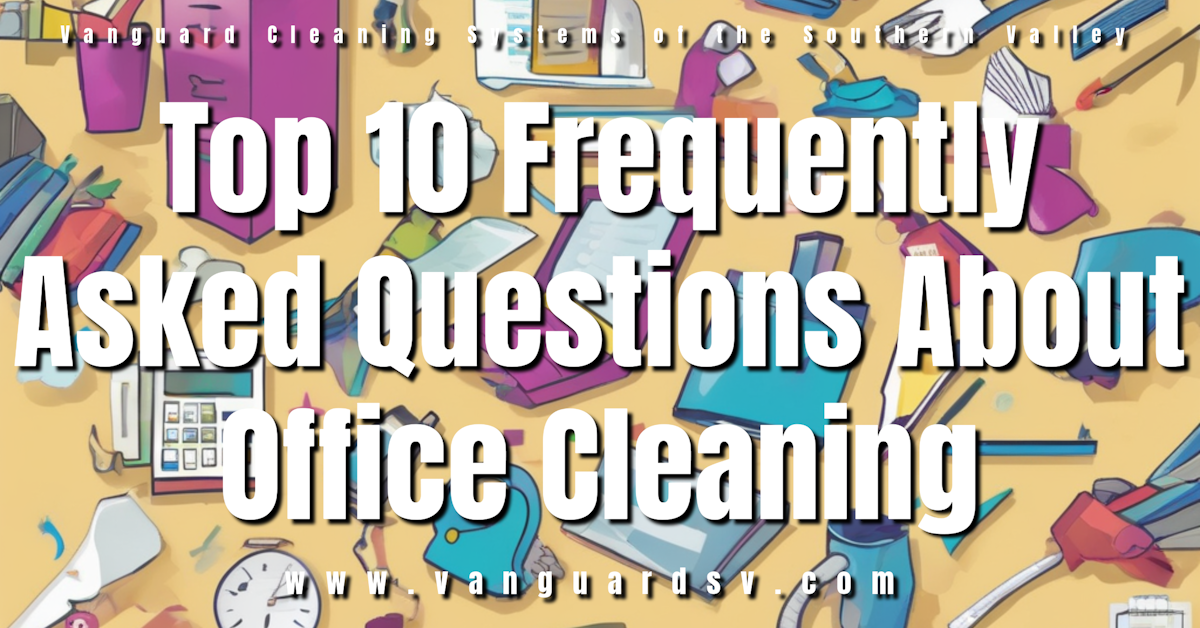Discover the secrets to a healthier, more productive workplace with our expert insights into the most asked office cleaning questions.

Navigating the Essentials of Office Cleanliness
A clean office reflects professionalism and promotes a healthier, more productive work environment.
It's a cornerstone of employee well-being and a vital aspect of workplace management.
Effective cleaning practices reduce the spread of germs, lowering absenteeism and higher job satisfaction.
Ensuring a consistently clean workspace is an investment in your company's future, impacting everything from staff morale to your bottom line.
Let's explore the key questions illuminating the path to achieving and maintaining the highest standards of cleanliness in your office.
What is the recommended frequency for office cleaning?
The frequency of office cleaning varies based on the area's usage, with high-traffic areas needing daily cleaning and lower-traffic areas less often.
Regular cleaning helps maintain a healthy environment and prevents the buildup of dirt and germs.
Desks and workstations should be cleaned at least once weekly, while bathrooms and kitchens may require daily attention.
A customized cleaning schedule can effectively address the unique needs of different office areas.
How can we ensure our cleaning practices are environmentally friendly?
Opt for green cleaning products and methods to ensure environmentally friendly cleaning practices.
Implementing recycling programs and using reusable cleaning tools can also minimize environmental impact.
Educating cleaning staff and office employees on sustainability practices enhances overall efforts.
Choosing products with reduced chemicals protects health and reduces ecological footprints.
What are the best practices for sanitizing workspaces to prevent illness?
Regular sanitization of high-touch surfaces with EPA-approved disinfectants is crucial to preventing the spread of illness.
Encouraging good hygiene among employees and providing access to hand sanitizers and disinfectant wipes can further reduce risk.
sanitizing shared equipment before and after use is also important.
A routine sanitization schedule, especially during flu season, can keep employees healthy.
How often should carpets and upholstery be professionally cleaned?
Carpets and upholstery should be professionally cleaned every 6 to 12 months, depending on usage, to remove accumulated dirt and allergens.
High-traffic areas may require more frequent cleanings to maintain appearance and hygiene.
Professional cleaning extends the life of these items and contributes to better indoor air quality.
Scheduling regular cleanings ensures a consistently clean and professional-looking office.
What is the difference between cleaning, sanitizing, and sanitizing?
Cleaning removes visible dirt and debris from surfaces while sanitizing reduces bacteria to safe levels as determined by public health standards.
sanitizing destroys or inactivates both bacteria and viruses on hard surfaces.
Each process plays a crucial role in maintaining a healthy office environment, with sanitizing being especially important in areas prone to germ spread.
Understanding and applying these differences ensures a comprehensively clean workspace.
How can we maintain air quality during and after cleaning?
Using HEPA filters in vacuums and air purifiers improves indoor air quality by trapping harmful particles.
Ensuring proper ventilation during cleaning helps dissipate any chemical fumes and reduces airborne contaminants.
Regular maintenance of HVAC systems also contributes to cleaner air.
These practices are essential for a healthy office environment, especially for individuals with allergies or respiratory issues.
What should be included in a basic office cleaning checklist?
A basic office cleaning checklist includes dusting, vacuuming, mopping, cleaning restrooms and kitchens, removing trash, and sanitizing surfaces.
Tailoring this checklist to the specific needs and layout of your office ensures thorough coverage.
Regular cleaning of electronic devices and shared equipment is also vital.
A well-structured checklist ensures no area is overlooked, maintaining a consistently clean and inviting workspace.
How can we address cleaning challenges in shared spaces?
Clear cleaning protocols and personal responsibility are key to managing shared spaces effectively.
Frequent professional cleanings and individual upkeep by employees can significantly reduce the spread of germs.
Communication and signage can help reinforce clean habits and expectations.
Addressing these challenges requires cooperation and commitment from all office occupants.
What are the safety considerations for cleaning staff and office workers?
Training cleaning staff on safely handling chemicals and providing personal protective equipment is essential for their safety.
Keeping Material Safety Data Sheets (MSDS) accessible allows for the informed use of cleaning products.
Employees should also know about cleaning schedules and product use to mitigate exposure risks.
Safety considerations protect everyone in the office and ensure compliance with health regulations.
How do we choose a professional office cleaning service?
When selecting a professional cleaning service, consider their experience, references, and commitment to green cleaning practices.
Discussing your specific needs and expectations upfront can ensure a good fit.
Ensure the service is insured and bonded for your peace of mind.
A reliable cleaning service is crucial to maintaining a healthy and productive office environment.
Takeaway
Maintaining a clean and healthy office environment is a collaborative effort requiring every team member's attention to detail and commitment.
By addressing these ten essential questions, you're well on your way to creating a workspace that looks great and promotes wellness and productivity.
We encourage you to implement these insights and continuously seek ways to improve your office cleaning practices.
Let's strive for a cleaner, safer, and more inviting workplace for all.
If you would like more information regarding the effectiveness of high-performance infection prevention and control measures, or if you would like to schedule a free, no-obligation on-site assessment of your facility's custodial needs, contact us today for a free quote!
In Bakersfield, CA, call (661) 437-3253
In Fresno, CA, call (559) 206-1059
In Valencia, CA, or Santa Clarita, CA, call (661) 437-3253
In Palmdale, CA, or Lancaster, CA, call (661) 371-4756

